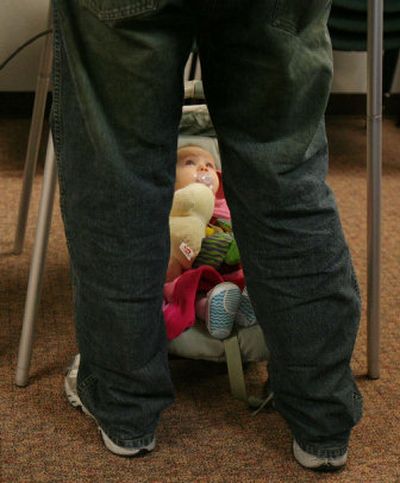Gay marriage ban OK’d

BOISE – Idaho voters approved a constitutional ban on gay marriage Tuesday, joining voters in South Carolina, Tennessee, Virginia and Wisconsin, where similar bans were approved.
Based on early returns that showed a wide margin of support, more than 70 percent of Idaho voters were in favor of the amendment, which not only bans gay marriage but also any domestic unions outside of traditional marriages.
Proposition 2, which pitted private property rights against the power of local governments to make land-use decisions, was headed toward a loss in early returns with 77 percent of voters casting no votes.
The race was closer on Proposition 1, which called on lawmakers to increase school spending by $219 million a year. Just over 57 percent of voters were against the plan, and more than 42 percent were for it.
More than 58 percent of voters were in favor of a constitutional amendment designed to limit the use of money from the state’s settlement with big tobacco companies to health-related purposes.
Although gay marriage is already illegal in Idaho, proponents of House Joint Resolution 2 said a constitutional change was needed to cement the state’s opposition to such unions and to prevent the courts from someday making them legal. But opponents of the measure have said it was redundant and discriminatory against those couples that don’t fit within Idaho’s norm.
Similar bans have passed in 20 states, and eight states – including Idaho – were set to vote this month on the matter. The nationwide attention to the issue came after Massachusetts became the first state in the country to legalize gay marriage in 2004.
Property rights initiatives also garnered attention in the West, with measures on the ballots in Idaho, Arizona, California and Washington. Idaho’s Proposition 2 was designed to force local governments to pay private property owners when new regulations reduce their land’s value. It also reinforces the 2006 Legislature’s decision to restrict local governments from condemning private property for economic development. Opponents said the proposition would promote expensive lawsuits, while backers said it would ensure that landowners aren’t harmed by bureaucratic land grabs.
Proposition 1, a campaign to boost education spending by $219 million per year, was perhaps the most confusing issue on the ballot. It began as a campaign to raise the state sales tax from 5 to 6 cents on the dollar. Then Gov. Jim Risch shepherded his own 1-cent sales-tax increase through the Legislature in August to pay for property tax relief.
But the proposition included a clause that changed the measure if sales taxes were increased before the election. Instead of raising the tax further, the proposition now simply directs the Legislature to provide $219 million to schools from some other source.
The group behind the initiative, Invest in Our Kids’ Education, said some Idaho schools are so poor that students use 30-year-old textbooks, and notes that the state’s per-pupil spending rate is among the lowest in the country. But opponents said that it would be nearly impossible for the Legislature to come up with an additional $219 million each year without raising taxes.
Generating the least controversy was the proposed Senate Joint Resolution 107, a constitutional amendment creating a permanent endowment fund for most of the settlement money Idaho gets from big tobacco companies as part of a lawsuit over smoking-related health care costs.